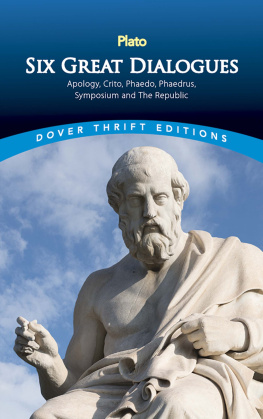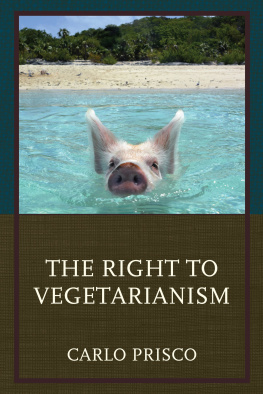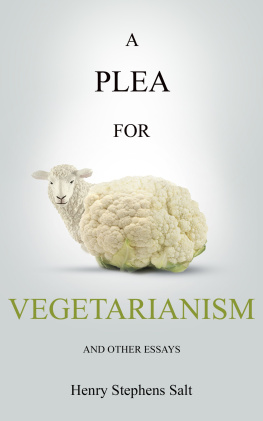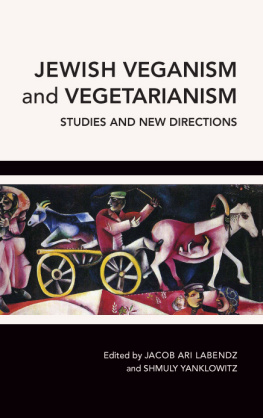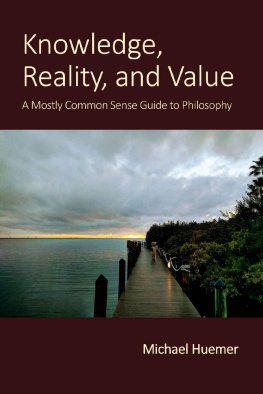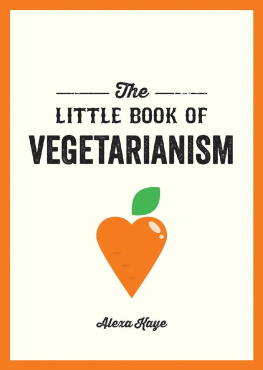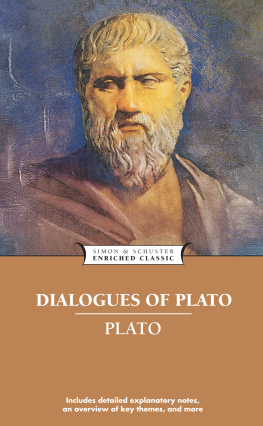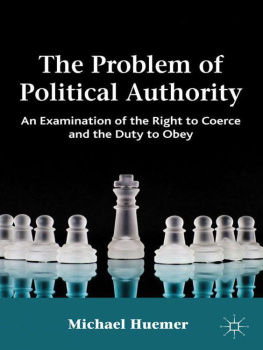Huemer - Dialogues on Ethical Vegetarianism
Here you can read online Huemer - Dialogues on Ethical Vegetarianism full text of the book (entire story) in english for free. Download pdf and epub, get meaning, cover and reviews about this ebook. year: 2019, publisher: Routledge, genre: Religion. Description of the work, (preface) as well as reviews are available. Best literature library LitArk.com created for fans of good reading and offers a wide selection of genres:
Romance novel
Science fiction
Adventure
Detective
Science
History
Home and family
Prose
Art
Politics
Computer
Non-fiction
Religion
Business
Children
Humor
Choose a favorite category and find really read worthwhile books. Enjoy immersion in the world of imagination, feel the emotions of the characters or learn something new for yourself, make an fascinating discovery.
Dialogues on Ethical Vegetarianism: summary, description and annotation
We offer to read an annotation, description, summary or preface (depends on what the author of the book "Dialogues on Ethical Vegetarianism" wrote himself). If you haven't found the necessary information about the book — write in the comments, we will try to find it.
Huemer: author's other books
Who wrote Dialogues on Ethical Vegetarianism? Find out the surname, the name of the author of the book and a list of all author's works by series.
Dialogues on Ethical Vegetarianism — read online for free the complete book (whole text) full work
Below is the text of the book, divided by pages. System saving the place of the last page read, allows you to conveniently read the book "Dialogues on Ethical Vegetarianism" online for free, without having to search again every time where you left off. Put a bookmark, and you can go to the page where you finished reading at any time.
Font size:
Interval:
Bookmark:

Dialogues on Ethical Vegetarianism
After lives filled with deep suffering, 74 billion animals are slaughtered worldwide every year on factory farms. Is it wrong to buy the products of this industry?
In this book, two college students a meat-eater and an ethical vegetarian discuss this question in a series of dialogues conducted over four days. The issues they cover include: how intelligence affects the badness of pain, whether consumers are responsible for the practices of an industry, how individual choices affect an industry, whether farm animals are better off living on factory farms than not existing at all, whether meat-eating is natural, whether morality protects those who cannot understand morality, whether morality protects those who are not members of society, whether humans alone possess souls, whether different creatures have different degrees of consciousness, why extreme animal welfare positions sound crazy, and the role of empathy in moral judgment.
The two students go on to discuss the vegan life, why people who accept the arguments in favor of veganism often fail to change their behavior, and how vegans should interact with non-vegans.
A foreword, by Peter Singer, introduces and provides context for the dialogues, and a final annotated bibliography offers a list of sources related to the discussion. It offers abstracts of the most important books and articles related to the ethics of vegetarianism and veganism.
Key Features:
Thoroughly reviews the common arguments on both sides of the debate.
Dialogue format provides the most engaging way of introducing the issues.
Written in clear, conversational prose for a popular audience.
Offers new insights into the psychology of our dietary choices and our responsibility for influencing others.
Michael Huemer is Professor of Philosophy at the University of Colorado, Boulder. He is the author of more than 70 academic articles in ethics, metaphysics, political philosophy, and epistemology, as well as five other books: Skepticism and the Veil of Perception (2001), Ethical Intuitionism (2005), The Problem of Political Authority (2012), Approaching Infinity (2016), and Paradox Lost (2018).
Dialogues on Ethical
Vegetarianism
Michael Huemer

First published 2019
by Routledge
52 Vanderbilt Avenue, New York, NY 10017
and by Routledge
2 Park Square, Milton Park, Abingdon, Oxon, OX14 4RN
Routledge is an imprint of the Taylor & Francis Group, an informa business
2019 Taylor & Francis
The right of Michael Huemer to be identified as author of this work has been asserted by him in accordance with sections 77 and 78 of the Copyright, Designs and Patents Act 1988.
All rights reserved. No part of this book may be reprinted or reproduced or utilized in any form or by any electronic, mechanical, or other means, now known or hereafter invented, including photocopying and recording, or in any information storage or retrieval system, without permission in writing from the publishers.
Trademark notice : Product or corporate names may be trademarks or registered trademarks, and are used only for identification and explanation without intent to infringe.
Library of Congress Cataloging-in-Publication Data
A catalog record for this title has been requested
ISBN: 978-1-138-32828-0 (hbk)
ISBN: 978-1-138-32829-7 (pbk)
ISBN: 978-1-138-32830-3 (ebk)
Typeset in Sabon
by Swales & Willis Ltd, Exeter, Devon, UK
When I became a vegetarian, in 1971, it seemed that everyone I ate a meal with was asking me why I didnt eat meat. My experience was different from that of Michael Huemer, who tells us that people rarely challenged him on his dietary views. Perhaps that reflects the fact that encountering a vegetarian was more unusual in 1971 than it was when he stopped eating meat in the 1980s.
Some vegetarians and vegans think of their dietary choice as a private matter, like ones religious beliefs. That was never my view. I became a vegetarian because I learned about the way animals are treated in factory farms. After some research and reflection, I reached a shocking but inescapable conclusion: there is an atrocity going on, unseen by most of us because it takes place in huge windowless sheds. In each of these sheds there are hundreds, thousands, or most often tens of thousands of animals living miserable lives so that we can satisfy our preference for a particular kind of meal.
I knew that I should not support that atrocity by purchasing and consuming its products. Keeping my own hands or stomach clean, however, wasnt the point. If we become aware of an atrocity, it is not enough to refuse to take part in it. We should not be bystanders either. We should do what we can to stop it, and telling others about it is an important step in that direction. So although I did not want to push my views on people who showed no interest in them, if someone asked me why I wasnt eating meat, I welcomed the opportunity to tell them about the strong ethical reasons for that choice.
Well, for the first couple of years, I welcomed the opportunity. Then I became tired of repeating the same facts and reasons over and over again, and I thought how good it would be if, whenever someone asked me why I dont eat meat, I could just give them a book and say Read this. When Animal Liberation was published in 1975, I started doing just that.
Now, more than forty years later, I have a better understanding of the many reasons and arguments that people can devise to defend their preference for eating meat. Some of these, like Animals eat other animals, so why shouldnt we eat them? have been refuted often before, and yet, like a jack-in-the-box, they keep popping up again. Others are new. In 1971, no one talked about climate change, so very few people had any idea that methane emissions from farm animals were making a major contribution to warming our planet. Although Huemer has chosen to focus his book on the ethics of eating meat from the perspective of what happens to the animals before they become meat, the need to minimize our contributions to climate change is also an important ethical reason for not eating meat.
Philosophical dialogues go back to Plato, who described, or imagined, conversations Socrates had with Athenians about how we ought to live. Dialogues on Ethical Vegetarianism is a worthy addition to this evergreen tradition. Lively and easy to read, the dialogues that follow capture the experience of doing philosophy as an active participant and not merely a passive spectator. They are also uncannily accurate in presenting what people actually say. Many passages recapitulate, sometimes almost word for word, what people have said to me in conversations about eating meat.
Huemer makes no secret of what side he is on, but he is first and foremost a philosopher and not a polemicist. Hence he is not interested in scoring cheap points against a weak opponent. To refute a philosophical argument, one must first state it in its strongest form. That is what this book does. Then it shows why those arguments are flawed or do not justify eating meat.
In the future, when people ask me why I dont eat meat, I will tell them to read this book.
Peter Singer
Princeton, New Jersey
My Journey
The worst thing I have ever done in my life is that I ate meat and other animal products for many years. I cant explain why I did this, except that I simply had reflected little, if at all, on the ethical status of it. I reflected about many things as a child, but not that. Meat tasted good, and no one seemed to see any problem with it. No one brought any issue to my attention. No one asked me to defend my behavior.
Next pageFont size:
Interval:
Bookmark:
Similar books «Dialogues on Ethical Vegetarianism»
Look at similar books to Dialogues on Ethical Vegetarianism. We have selected literature similar in name and meaning in the hope of providing readers with more options to find new, interesting, not yet read works.
Discussion, reviews of the book Dialogues on Ethical Vegetarianism and just readers' own opinions. Leave your comments, write what you think about the work, its meaning or the main characters. Specify what exactly you liked and what you didn't like, and why you think so.


